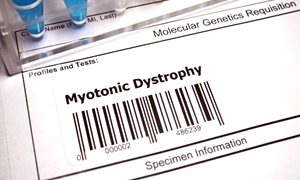
My name is Tom Ederveen, born at the Radboud in 1987 and raised in Nijmegen/Wijchen, so as you can see I’m quite ‘honkvast’ as they say in Dutch. I currently work as a postdoc at the CMBI bioinformatics department. My focus is on the computational analysis of (omics) data generated in the wet lab, and I have a strong interest in microbiomics. This involves complex data derived from microbiome research, which is the study of (human) micro-organisms such as bacteria found in our own gut or skin. My goal is to make biological sense out of these complex data. My research theme is Nanomedicine, but I am actually connected to many research themes like Inflammatory and Infectious diseases, and do not recognize myself in one specific research theme. Therefore, I am happy to learn that this system is likely going to change in the near future.
Where do you live and with whom?
I currently live in an apartment close to the (Nijmegen) Goffert station and park.
When you were a kid what did you want to be when you grew up? Can you tell us something about your child years.
I grew up in Wijchen, directly next to Nijmegen. I remember I was passionate about space(craft) and dinosaurs, the latter probably because of the Jurassic Park hype back then. Hence, I wanted to become an archeologist, or paleontologist actually. It didn’t work out that way, which is okay, because I don’t like travelling that much, nor being abroad for a long time. Instead, I studied Biology, and ended up working on the one thing for which I always held a fascination: DNA and evolution.
What was your previous academic training, where did you study and why did you choose that study/those studies?
I first did my bachelor as a lab technician at the HAN University of Applied Sciences in Nijmegen. After my bachelor I wanted to improve my understanding of complex biological processes, and decided to study the master Medical Biology at the Radboud University. Those years, I focused especially on molecular cell biology, genetics and immunology. I gradually came to learn that performing wet lab studies myself was not really my cup of tea, and instead realised that I find more joy in analysing the data I had generated.
I kept working in the wet lab during and until two years after my master, after which I joined the CMBI department in the Bacterial Genomics group of Sacha van Hijum. This is where everything aligned for me, because I was now able to fully focus on the analysis of data in order to understand biological mechanisms, which I like the most. At the CMBI I focused (and still do) mainly on bacterial (comparative) genomics, and on host-microbe interaction by studying human microbiomes and linking their characteristics to various host factors such as from the immune system or any phenotypic trait. In 2019, I eventually finished my PhD as a joint candidate of both the CMBI and department of Dermatology.
Of which of your research discoveries, you are most proud of?
Considering the dense collaborative nature of my work, and my aim to understand clinically relevant biological processes, I am mostly proud of my work on the human skin microbiome in relation to host genetics. Together with the Dermatology department of the Radboudumc, we have shown that a specific group of skin bacteria is absent in patients with the skin disease ichthyosis vulgaris who, because of a genetic defect, lack the skin barrier protein called filaggrin. Interestingly, this genetic defect in the filaggrin gene is also a predisposing factor for development of the common skin disease eczema. In our current follow-up studies, we observe that this same group of bacteria also plays an important role in early host defence responses and immune signalling of the skin, shedding new light on the pathogenesis of eczema.
What is your most important scientific challenge in the coming 5 years?
That would be the explosive increase in research data that we generate. Extracting biology from simple datasets, will become even more challenging as data becomes bigger and increasingly complex. We have to get rid of the idea that more data is better, and that machine learning will solve everything for us. In the meantime, the data graveyards are piling-up and hardly anyone is really re-using data. This, of course, needs to change in the coming years, and FAIRification of data should receive priority.
Furthermore, I don’t believe that data science alone will provide us with more answers per se. I rather believe that you have to get back to the lab and design experiments to prove biological concepts that you extract from the data of earlier experiments. So although I now have a strong focus on computational biology, bioinformatics is only a toolbox for me, and I believe that for any bioinformatician it is important to stay in close collaboration with wet lab researchers as we need each other to accomplish our shared goals: to improve our healthcare by better understanding biological processes.
If you could choose any mentor, who would this be?
If I had the opportunity it would be great to be mentored by Eran Segal, a computational biologist from the Weizmann Institute of Science. He managed as one of the first to find a relevant (personalized) application for measuring the human gut microbiome, by using it in a machine learning model to predict blood glucose responses after eating certain types of food. I would like to learn from him how he managed to translate this fundamental microbiome work into a clinically-relevant application. Really impressive work.
What is your favorite topic: molecules - patients - population?
I’m mostly interested in mechanistic understanding, but preferably with (clinically-relevant) application, so from molecule to patient.
What should be changed / improved in the scientific community?
As a bioinformatician you typically work with (are dependent on) large data that has been generated by another wet-lab researcher, making it inevitable to team up. In such situation, it is difficult for a bioinformatician to get first authorships, as they are usually reserved for those who performed the experiments and generated the data (understandable). Nevertheless, hands-on data analysis time can be just as time-consuming and challenging as running the experiments. Consequently, as a bioinformatician you tend to have lots of shared-first co-authorships, but you nowadays are still required to have many ‘actual’ first authorships to make a good chance on receiving personal funding in order to become an independent researcher. If you fail at getting funding in the first years as a post-doc you have an even harder time getting funding thereafter, but all of that doesn’t necessarily reflect ones quality of and contribution to research. I definitely don’t have the answer to this but it might be something to reflect upon.
Is there anything we can wake you up for in the middle of the night?
No. There is hardly ever something important enough that can’t wait until the morning. I value a good night’s sleep, besides, good luck waking me up in the middle of the night : - )
What is the thing that irritates you most?
In my experience, far too often research data is not well-documented or metadata is unclear. It bothers me, for example, when data is considered ‘published’, while (metadata) documentation is poor, making data reuse a challenging task. Or worse, even in 2020 studies are being published without release of their research data. Well-documented data publication, should therefore equally be one of the criteria to value science.
Who would you like to have dinner with, if you had the chance?
It would be interesting to have a chat with late painter and artist Salvador Dalí. I’ve always been fascinated by his work and his eccentric personality. Interestingly enough he was fascinated himself by DNA and structure of the double helix, and even dedicated some of his work to the concept of DNA (for instance see his painting named Galacidalacidesoxiribunucleicacid), so that could make for an interesting conversation.
How do you relax from the demanding job being a scientist?
Simply having dinner and being together for a long evening with friends and family is what I enjoy most and what helps best to unwind from a long or hectic day.
Do you have a tip for our most junior scientists?
It is cliché but (I think) still necessary to emphasise: dare to say ‘no’. There is always more work than can be done, and when you need to finish your PhD in 4-5 years (or any project) it is important to make decisions on where to spend your time and efforts. To make these decisions it can also help to define a specific research niche for yourself, in order to bring focus and to synergise most of the work you perform. That way you can be of more value to others around you while also adhering to your own goals.
Please add a photo which represents a remarkable event or experience you were part of? Please explain.
Not really something remarkable, but simply me in my daily working environment :
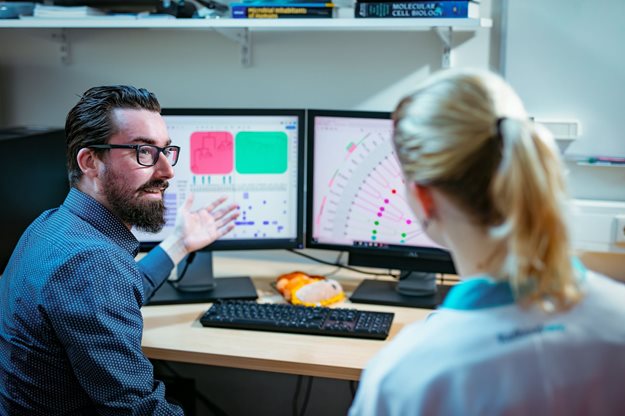
For more information about my work in the Radboudumc please see my website.
Related news items
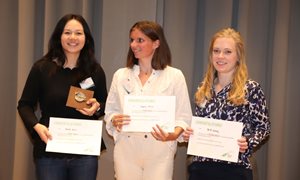
Renee Salz wins prize for best presentation
10 May 2022 Renee Salz won the award for best oral presentation during the Rolduc genetics retreat, organized by the Dutch and Belgian Societies of Human Genetics in Brugge. Her presentation was titled "Variant effect prediction based on long read transcriptomes". go to page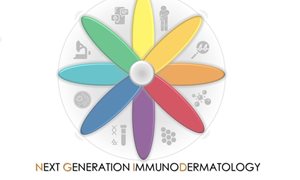
Large NWA ORC grant awarded for national skin research: Next Generation ImmunoDermatology
23 March 2022Research for better treatment methods for chronic skin diseases.
go to page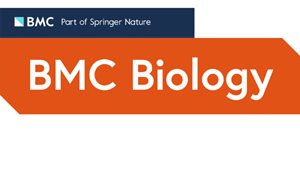
Novel high-resolution targeted sequencing of the cervicovaginal microbiome published in the Journal of BMC Biology
28 December 2021 This project of William Melchers, Karolina Andralojc and Mariano Molina describe a novel sequencing method to profile the cervicovaginal microbiome at the species level and with the potential to elucidate the role of the microbiome in hrHPV-induced carcinogenesis. go to page

